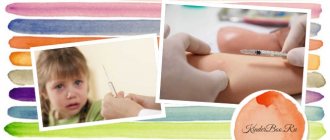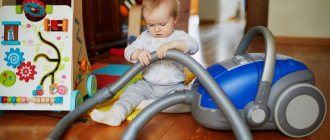Article:
A child’s bad habits cause anxiety among parents. This is quite reasonable, because they often persist into older age and even progress into adulthood. It is extremely difficult to get rid of them. And if a child who, for example, bites his nails, is looked at condescendingly, then an adult will at least cause bewilderment. Experts advise not to let the situation take its course, but to start acting immediately. The actions of adults should be purposeful and persistent, but at the same time gentle, so as not to aggravate the problem and not cause psychological trauma to the child.
Why nail biting is considered a bad habit
Dr. Komarovsky believes that any bad habits are formed as a repeatedly repeated sequence of certain actions. Over time, the brain ceases to control them, these actions become reflexive. Without wanting it or noticing it, the child puts his hands in his mouth, pulls his earlobe, pulls his hair, swings his legs, and picks his nose. The danger is that children’s habits shape the character of an adult, who is much more difficult to wean than a child.
Harmful actions are those that can cause harm. Doctors also see a danger in the habit of biting nails for a number of reasons:
- Nails have a protective function, protecting the fingertips, the most vulnerable areas, from damage. Constantly nibbling them to the very root leads to the fact that the skin on the fingers becomes very thin and sensitive. This threatens injury and inflammatory processes not only of the skin around the nail plate, but also of the deeper layers.
- The appearance and color of nails gradually changes, they become brittle, become very peeling, deformed, and in some children they stop growing altogether.
- Pathogenic microorganisms enter cracks and wounds from the oral cavity, which can cause inflammation and infection. If bacteria enter the bloodstream, it can cause serious illness, including sepsis.
- Much more often the opposite happens. Dirt from under the nails, where viruses and bacteria that get there actively multiply, is swallowed by a child when he bites his nails. There is also a high risk of infection with worms.
- A child’s nail often injures the soft tissues in the mouth, thereby causing stomatitis. Damage to tooth enamel leads to tooth decay.
Although it is not customary to make psychiatric diagnoses before the age of 18, doctors clearly consider the habit of biting nails to be a disorder, which even received a medical name - onychophagia.
What to do
How to eliminate this habit in a child?
Children can bite their nails at any age. A 2-year-old child bites his nails, what should I do?
Here are some effective home remedies for baby's nail biting:
Calm worries
How to stop a child from biting his nails? If you notice that your child is biting their nails more often when they are stressed or worried about issues such as changing schools, moving to another location, or family conflicts, take time to talk to them and discuss what they might be talking about. worry.
Trim your nails regularly
Trimming your nails is a good way to minimize the urge to bite them. Trim and file your child's nails every week to ensure there are no sharp edges that would tempt them to chew them.
Girls can get their nails done at the salon so everything will look shiny and beautiful. Attention and care for her nails can keep her from getting bitten again.
Suggest an alternative
How to avoid biting your nails and the reasons for this? Give them something else to break their nail biting habit. The Anti Stress Ball is great for relieving anxiety. Squeezing it in your hands will help your child relax. Events and projects, clubs they attend are another good option. Arts and crafts and stimulating their imagination relieve stress. Outdoor activities, entertainment and sports are also some of the best ways to release pent-up energy. Most often, children aged 3 and 4 years old experience the habit of biting their nails. How to stop a 3-year-old child from biting his nails? - Since talking is unlikely to happen, use anti-stress toys or entertaining games.
Become aware of their habit
Habits such as nail biting are mostly unconscious. Your child doesn't notice that he's doing this most of the time and is therefore surprised when you yell at him to stop. Talk to your child about what causes him to bite his nails and suggest secret ways to remind him when he does it. It's good when done in a subtle way, especially in public places where children might be embarrassed. A tap on the shoulder or a code word that only two people know about is a good start.
Reward
When you see your child moving in the right direction, appreciate and reward him
Buy him ice cream or a new toy he's been wanting. Children naturally tend to please their parents and pay attention to them. Therefore, praising their mindfulness regarding their habits or forming healthy ones encourages them to repeat it
Find the method that suits your child
How to stop biting nails and eliminate this habit in children? It can be very difficult to get your child to stop biting their nails. The same method may not work for all children, so try new ones to see what works. Habits are hard to break, and since anxiety doesn't develop overnight, it takes time to stop biting your nails or create a new release. For example, a 4-year-old child bites his nails - be patient with him. If none of the methods work and your child seems overly anxious, consult your pediatrician for help. Anti-nail polish may be suitable for girls.
The Bitter Taste Trick
There are baby-safe liquids available in medical stores or recommended by your pediatrician that are made to stop nail biting. Apply this to your child's nails. Their bitter taste serves as a reminder to stop biting your nails.
Don't make a big deal
If you are worried about their habit, they may pick up on your anxiety and become irritable. They may also use this as a way to get your attention if you are not keeping an eye on them in other ways.
Why do children bite their nails?
In most cases, experts agree that stress and a depressed state contribute to the development of a bad habit. This is observed during conflicts in the family, during adaptation to kindergarten or school, when changing place of residence or educational institution. In teenagers, this habit develops against the backdrop of disagreements with parents and friends, worries about first crushes and falling in love.
Dr. Komarovsky believes that in some cases the habit of biting nails develops from another bad habit - sucking fingers, which, in turn, arises due to dissatisfaction in the sucking reflex in babies (for example, the child was weaned early, during the period of weaning from the pacifier ).
There are other reasons of a psychological and pedagogical nature:
- Bad example. If dad or mom, one of the relatives or the immediate environment (in kindergarten, at a party) bites their nails in front of the baby, you can soon notice how the child begins to pull his fingers into his mouth. In a family with two, three or more children, almost all of them will bite their nails, since it is enough for one to demonstrate this activity, and the others will become infected.
- Auto-aggression, that is, conscious or unconscious harm to oneself. Gnawing down to the soft tissues, the child will not stop, despite the pain, he will peel off the nail plate along with the meat.
- Resistance to adult control. This usually happens during transitional periods: at 3-5 years of age or adolescence.
- Insufficient hygiene. If parents rarely cut their child’s nails, they get in the way, touch objects, and cause a lot of inconvenience. Sometimes the plate exfoliates and breaks due to injury or metabolic disorders. Not knowing how to use scissors, the child cannot come up with anything better than gnawing on protruding nails. Quite quickly this develops into a habit.
- Excessive concentration on something. You may notice that your child bites his nails intensely while solving a complex problem, reading a book, watching TV, or playing a computer game.
Most often, nail biting begins at the age of 4-5, less often - children 2-3 years old. By adolescence, the habit persists in almost half of these children. As soon as parents notice bitten nails or catch their child doing this activity, measures should be taken. The older the child and the more advanced the condition, the more difficult it is to get rid of it.
Reasons for the need to bite nails
As mentioned above, onychophagia is associated with stressful and anxious situations, namely with the fact that a person is unable to express negative emotions. Experiencing anger or anxiety and not knowing how to throw it out, a person resorts to auto-aggression, that is, directing negative emotions and harmful actions towards himself. Auto-aggression manifests itself in self-humiliation, self-blame and a tendency to cause bodily harm to oneself, including suicide attempts. Thus, onychophagy is one of the weaker forms of this behavior.
In the animal world, claws are weapons, tools with which you can cause real damage to another creature. In humans, nails do not have such a meaning, but have more of a protective and symbolic meaning. However, in our language there are expressions such as “extend claws” or “show claws”, meaning a demonstration of anger or other strong negative emotion. Therefore, when a person bites his nails and gets rid of them, he, as it were, hides his aggressiveness, directs it inward, although he feels it in relation to others. Often, this disorder affects people with low self-esteem, cowardly, weak and unable to stand up for themselves, or the completely opposite type - people who easily fall into an aggressive state and thus try to replace and suppress their temperament. Another reason, but much less common, is a person’s attraction to actions that are condemned in society, or that he personally finds unacceptable, but desirable.
How to wean yourself from a bad habit
If parents did not pay attention to the fact that the child was biting his nails at least once, this action will be perceived as completely “legal.” That is why you should constantly monitor your baby’s habits and prevent him from sucking his fingers, pulling his hair, swinging his legs or biting his nails.
Many modern pediatricians generally agree that a child should not be allowed to put his hands in his mouth. Often mothers do not pay attention to this during the teething period, when the baby scratches his gums in this way. But there are a lot of modern devices for these purposes - from teethers to special toys that are supposed to be disinfected and given to the child.
You should sit down and talk to your baby. It doesn’t matter how old he is, you need to talk to him like an adult. It is important to clearly and reasonably explain to him why biting nails is prohibited and even dangerous. The child must know what exactly he is doing wrong and how it threatens him specifically. Perhaps in a conversation it will be possible to find out the reason for this behavior.
If nail biting has already become a reflex, you will have to think and choose the right behavior correction tactics. The fight against a bad habit must be purposeful; under no circumstances should you give in to slack.
Caring for baby's hands
Parents should develop the habit of caring for their child's hands and nails every day. The nails should be cut very short, and if necessary, file them, removing bends, fragments, and hangnails, so that the baby is not tempted to tear off or chew something off.
For young fashionistas, a mother’s beautiful manicure turns out to be very effective, which she compares with her daughter’s ugly, bitten nails. To demonstrate the difference, you can take scissors and a nail file, treat the nails, and possibly cover them with varnish, preferably bright. Sometimes it works the first time. If it doesn’t help, after a day or two the nails are bitten again, you should just treat them, but not paint them. Apply paint only if after the next inspection they appear unharmed.
Important: For children's manicure, you should choose only special children's varnishes that do not contain acetone.
At the same time, if necessary, you should work on strengthening the child’s nail plate so that they do not peel or break off. To do this, it is important to review the baby’s diet, enriching it with foods high in calcium, vitamins and minerals. If necessary, consult your pediatrician about taking multivitamins. For older children, you can buy special varnishes for strengthening at the pharmacy or go to a cosmetologist and have your nails strengthened with acrylic powder.
Special devices and preparations
Some children bite their nails far beyond the free edge, as they say, “with meat.” In this case, only wrapping your fingertips with a special adhesive plaster will help. This way the child will not be able to get to the record. Very young children can wear anti-scratch mittens that are softly fixed on the wrist. For many, a couple of weeks of such restrictions ends in successful weaning from a bad habit. Of course, such methods are not suitable for children attending kindergarten, and even more so for schoolchildren.
For them, you can try a special nail polish, for example, “Nekusayka”, “Belweder”. Harmless to children's health, but bitter in taste, it leads to the fact that the child completely stops putting his fingers in his mouth. Varnish helps at the initial stage of onychophagia, but if the habit is firmly ingrained, most likely the remedy will be powerless.
Creating psychological comfort
To relax during overstrain and stressful situations, massage, water treatments, long walks in the fresh air, and soothing herbal tea recommended by your pediatrician are suitable. You need to spend as much time as possible with your child, limiting the time you watch TV and computer games. At moments when he is busy on his own or with his parents doing something interesting, you can notice that he “forgets” to bite his nails. You can wean such a child by constantly distracting him from this activity.
Sometimes it happens that the child lacks precisely these repetitive actions. Girls can replace the habit of biting their nails, for example, by crocheting or beadwork, embroidery, and other types of needlework. The boys are invited to assemble a construction set, some small parts, and engage in robotics. This not only develops the ability to concentrate on the hands, but also helps to understand that fingers are a very important tool that should be protected. Wounds and inflammation due to a bad habit lead to severe pain, loss of sensitivity and temporary disability when the child will not be able to do what he loves.
For some, the so-called replacement action is suitable. For example, when watching TV or reading a book, place seeds, nuts, and favorite fruits and vegetables in front of the child. Anti-stress toys, which can be made together from natural materials, filling them with rice, peas or buckwheat, are a good way to “occupy” your hands.
Psychologists advise teaching your child to express his emotions, always talking to him, finding out what is the reason for his worries, and helping him solve difficult situations. Then the accumulated internal tension will not result in bad habits. Some psychological techniques will also help, for example, breathing exercises, slowly counting to 10 as you exhale, and so on.
Training methods
Particularly impressionable children are helped to “come to their senses” and give up a bad habit forever by demonstrating what it leads to. You should select several of the most frightening pictures, examples of the negative consequences of nail biting, accompanied by disappointing comments.
You can tell kids a fairy tale about two friends, one of whom bit his nails, and the other did not have such a habit. For older children, read a medical encyclopedia about harmful bacteria and worms, watch educational cartoons or medical programs. If possible, examine the subungual dirt under a microscope, be sure to emphasize that all this is inside as soon as the hands enter the mouth.
Folk remedies to fight the habit
If you are sure that you have managed to eliminate the physiological or psychological cause, but the habit of biting your nails remains, you can try using traditional medicine. Here are some useful tips.
- Spread something bitter on your fingers. At 11 or 12 years old, children no longer fall for such a “divorce”, but for a baby under one year old it can work. If you don’t risk using mustard or agave juice, you can purchase a special varnish that is produced for children. This varnish is harmless; you just need to spread it on your child’s nails. Thanks to its bitter taste, this remedy is quite capable of “discouraging” a bad habit. As they say - “wedge by wedge.”
- Cover your nails with adhesive tape. This is a very effective way for children: none of them will chew the patch.
- Proper nail care. If a girl has developed the habit of biting her nails, teach her how to properly care for her nails. From the age of five, girls can do their own manicure using tools from a children's manicure set. However, it will also be useful for boys to learn how to care for cuticles and take care of their nails.
- Fighting stress. If nail biting is associated with excessive nervousness, it is worth teaching your child how to properly relieve tension. There are special breathing exercises for this - slow inhalations and exhalations (for teenagers) or a remedy such as clenching and relaxing your fists (for kids).
- Development of a conditioned reflex. To some, this remedy may seem unnecessarily cruel, but it is quite effective. You need to put a bracelet on your child’s hand, either by purchasing it or making it from an elastic band. As soon as you notice that he involuntarily pulls his fingers towards his mouth, simply pull back the bracelet and let go. The rubber band should lightly click on the child’s hand, so that it is not painful, but unpleasant. After 5–7 times, a conditioned reflex is developed, and the child begins to monitor the behavior of his hands.
With the help of a special nail coating, the child will bite his nails less and less until the habit disappears completely.
What not to do
Grandmothers used an analogue of a modern safe bitter varnish: mustard or red pepper, which they rubbed on the baby’s fingertips. It should be understood that instead of the mouth, the child may well rub his eyes, and then a burn to the mucous membrane is guaranteed.
Having tried all the methods and not getting any results, in desperation parents try to influence with punishments. If you remember that in most cases the cause of a bad habit is stress, you can understand that rough pulling, slapping the hands and lips will not solve the problem; on the contrary, it will only aggravate the situation. You need to act persistently, but quite gently.
If, despite all efforts, the child continues not only to bite his nails, but does it with some frenzy, you should contact a neurologist. It is quite possible that such a habit is a precursor to attention deficit hyperactivity disorder, which in the future can result in serious problems, and at the initial stage is quite amenable to correction.
What to play with a child who bites his nails
Fairy tale. Together, come up with a story about a fictional character who—what a coincidence! - He loved to bite his nails. Take turns with your child and suggest options for the development of events: maybe the character once met a good fairy who waved her magic wand and helped him, or did he suddenly turn into a kitten and long claws simply became necessary for him?
Guessing game. Invite your child to close his eyes and determine by touch the fragment what kind of object you are showing him. Prepare materials of different textures in advance: a piece of sandpaper and suede, a shell, a peeled apple or grape, a massage brush-comb. Then switch: now you close your eyes, and the child will invite you to feel various objects.
Hello little man! Using a cosmetic pencil or washable felt-tip pen, draw faces on the nails of your baby's index fingers. Give the little people names and act out several scenes with their participation: let them visit each other, walk or dance together.
How to take care of your child's nails
Hygiene procedures play an important role.
How to stop a child from biting his nails: recommendations
You need to regularly examine your baby’s fingers, make sure there are no hangnails, broken nails, or sharp corners. The child will not calm down until he takes a bite.
If he is old enough, he needs to be trained to take care of his nails. Explain to your child that neatly trimmed nails are beautiful. At the same time, do not forget to praise your child for clean or neat nails.
Girls can get a beautiful manicure , which they will try to preserve. A manicure with any pattern will be especially valuable.
Advice for moms and dads
If your child bites his nails, approach this issue comprehensively: observe the child, make notes about his behavior in a notebook: try to determine at what point the baby begins to pull his fingers into his mouth. Perhaps you will notice that your child’s desire to bite his nails arises after returning from kindergarten or school, after a conflict at home or watching TV? In this case, you can already determine what nature the cause of nail biting is. But the main thing in any case is not to scold your child for his addiction. You must understand that it is more difficult to wean a child from biting his nails than it is for an adult to wean himself from this habit. Be loyal to your child, treat the situation with understanding, then the baby will reciprocate and trust you.
The main causes of the problem
Experts identify two groups of factors influencing the development of onychophagia: physiological and psychological.
Physiological factors
- Condition of the cuticle . In some children it peels off and “bulges.” Therefore, without waiting for help from their parents, they try to improve their appearance.
- Deficiency of various vitamins and minerals . Thus, with a reduced content of minerals, vitamins E and group B in the body, the nervous system can malfunction. In this case, nervousness and anxiety may develop, which finds a way out in this way.
- Parasites . Russian doctors believe that the presence of worms or other parasites in a child’s body can cause an obsessive desire to bite nails.
Psychological factors
- Negative assessment from others . This also includes reproaches, phrases “But Aunt Masha has a son...”, inappropriately high demands from adults, and so on.
- An emotional state that may be associated with increased anxiety, self-doubt, and low self-esteem, which is often a consequence of criticism from others. Biting your nails helps relieve some of the tension.
- Conflicts between parents, problems in the family . Children are sensitive to emotions. When the situation in the house becomes tense, the child reads the changes instantly. The negativity of the external environment puts pressure on him, nervous tension grows, which finds a way out through biting the nail plate.
- Lack of contacts, socialization , and problems communicating with peers also trigger onychophagia.
- “Drama club, photo club...” . Constant overload (emotional, physical or mental) can find a similar outlet.
- "An apple from an apple tree" . If someone with authority over a child (most often parents) bites his nails, then with a high degree of probability he himself will copy this behavior.
Note to moms
The most common schemes for combating a bad habit are:
- Affection, attention to the child.
- Communication, explanation of what will happen if you bite your nails.
- Review your child's diet; it may be lacking nutrients.
- Make sure your child follows a daily routine, teach him to fall asleep on his own, but if he is very scared, do not leave him alone yet (here it is important to feel the difference between whim and real anxiety).
- Use art therapy: draw your fear, cover it up or sculpt a monster, and then crush it with your hands.
- Walk more (just not along the highways).
- Compose fairy tales that repeat situations that happen in your family, but in fairy tales the baby must win.
- Depending on the child’s hobbies, sign him up for some sport, swimming, or dancing.
- And most importantly - hugs, goodnight kisses, tactile touches, massages, a soft voice, positivity, which will tell the baby that everything is fine in the family and with him and there is nothing to worry about.
Harm of habit
A nasty, let's face it, habit affects the attitude of peers, who can make the child a subject of ridicule. All this will increase anxiety, stressful situations will become constant, in adolescence the child will feel much more lonely, and the vicious circle will be very difficult to break. As a result, an adult will grow up who continues to do this, which will also affect social relationships.
Now about the medical aspects of the problem:
- The baby will grow nails with an irregular plate, which is very unsightly, uncomfortable, and normal nail growth is excluded.
- A huge number of microbes, worm eggs, dead epidermal cells, etc. accumulate under the nails. All this enters the gastrointestinal tract through the mouth and does not add health at all.
- The cuticle and skin around the nail are constantly inflamed, torn hangnails, infectious lesions, hematomas, and bleeding are possible.
- With the constant use of one or several teeth (usually the same ones), dental problems arise, including periodontal disease, and the teeth themselves can acquire unsightly physiological characteristics.
Traditional methods
How to stop a child from biting his nails using folk methods?
In combination with the proposed methods, you can use tips that have been used for many years:
- Lubricate your nails with something bitter: mustard or pepper. It is worth remembering the danger of contact with the mucous membranes of the eyes; the child can get a burn if he just rubs his eyes.
- Apply green paint to your nails. An unpleasant appearance will repel the baby, and a green mouth after nails will also cause disgust.
- Make your child an aromatic pillow with mint, lemon balm, chamomile, and lavender. At the same time, you need to be sure that he is not allergic to these plants.
Psychologist's advice
First of all, you need to identify the cause of stress. The best way is to ask your child to depict people, objects, animals that surround him in everyday life. What a child depicts in black or in dark colors will indicate a threat to the child’s psyche
Often children with severe neuroses paint the whole picture with black paint. For a child, it is very important not only the presence of parents throughout the day, but also physical contact with them, hug the baby, caress him, praise him, pat him on the head. Show by personal example how to maintain nail hygiene and how to properly perform manicure procedures. If a child copes with increased activity or excessive aggression in this way, it is better to send him to a sports section. Keep your baby busy with creative activities aimed at developing fine motor skills. Show your toddler with examples (you can use photographs) what bad consequences what he does can lead to. Fairytale therapy can have a good effect. You can think of how one person, or maybe even a bunny, bit his marigolds, and another did not, and how other animals treated them, how it ended for each of them. Take care of the correct daily routine; it is necessary that the baby has daily walks in the fresh air, eats food in a timely manner, and has both active and quiet activities. Use sedatives, both in the form of tea, candles with a pleasant aroma, and taking water treatments with sedatives. In rare cases, medications may be prescribed, for example, piracetam or pantogam, phenibut, drugs containing magnesium, and homeopathic remedies. Some parents purchase a special bitter varnish and paint the child’s nails with it; previously, the option of spreading pepper or garlic on the surface of the nail was used.
However, you need to understand that this method can and will discourage the child from putting his fingers in his mouth, but will not solve the cause of onychophagia.











